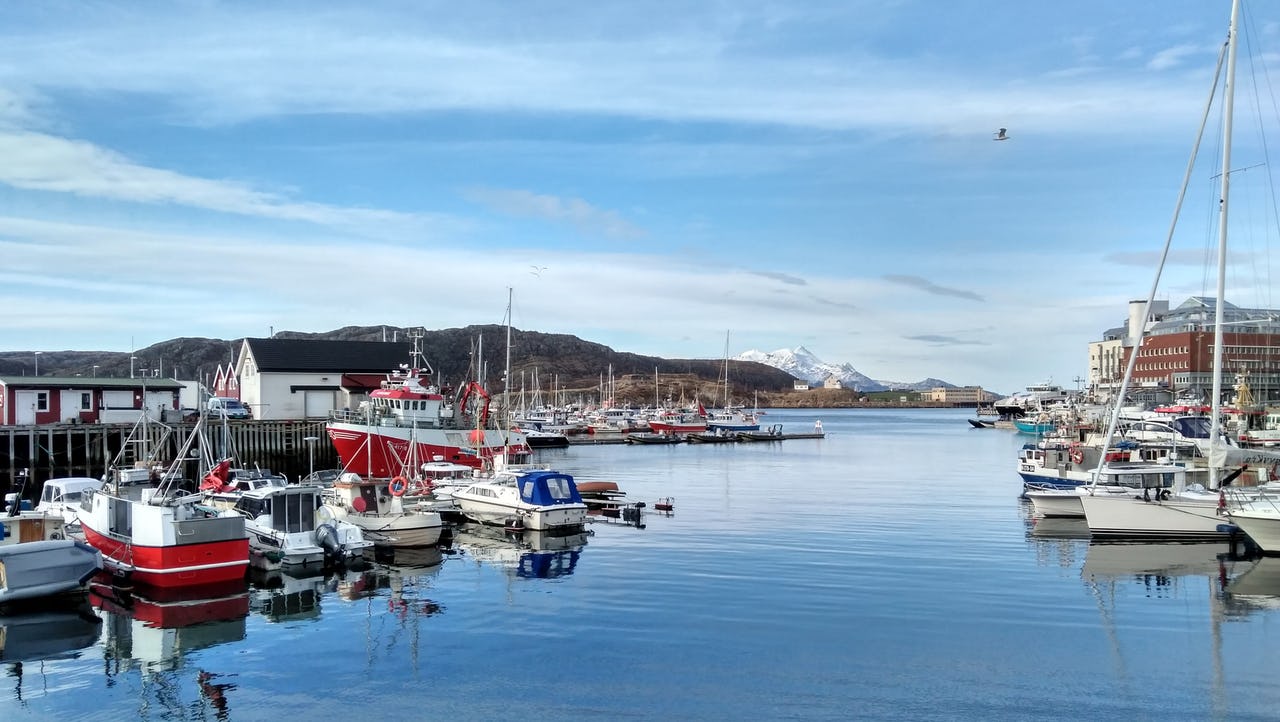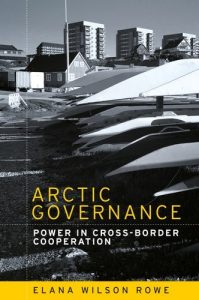Rethinking Arctic Governance: Interview with Elana Wilson Rowe

The harbour of Bodø in April 2019. Photo: Liubov Timonina
“If we go back in 2007 and recall Russian flag planting, when everyone was like ‘oh, the sky is falling!’ — it actually kicked off one of the most cooperative periods in Arctic governance that we have seen”
On a crisp and windy April afternoon in Bodø, Liubov Timonina and Romain Chuffart sat down with Dr. Elana Wilson Rowe, in marge of the High North Dialogue 2019, to discuss her recently-published book Arctic Governance: Power in Cross-Border Cooperation (Manchester University Press, 2018).

Dr. Wilson Rowe is a Research Professor at the Norwegian Institute of International Affairs (NUPI) and an Adjunct Professor at Nord University in Norway. In her book, Dr. Wilson Rowe explores the contested but largely cooperative nature of Arctic governance in the post-Cold War period, and the ways in which power has shaped both cross-border cooperation and performance of diplomacy in the region. The book touches upon Russia’s role in the Arctic Council and examines how the Arctic governance can be understood as a competition for the exercise of authority over certain places and certain audiences Taking a multidisciplinary approach to governance, security and diplomacy in the Arctic, it calls for establishing more inclusive and situated ways of looking at the interplay among diverse stakeholders in the North.
“Probably, one of the challenges in the Arctic politics right now at the level of states and diplomacy is how, in the absence of trust, to keep cooperating in areas of mutual interest and look at actual practices and ask, what do they seem to indicate. On the level of people-to-people contact, I think, Arctic cooperation and global politics in general is absolutely well-served by citizens who realise that people across the border are not so different.”
Looking through a hotel window at distant rugged and snowy peaks, Liuba, Romain and Elana contemplated rethinking Arctic governance and our approaches to political power and its role in shaping the complex relations between traditional Arctic States, non-Arctic States and non-State Actors.
Arctic Governance is available for open-access download. Below you will find the full fifteen-minute interview with Elana Wilson Rowe. Hope you enjoy listening to and reading this conversation as much as Romain and Liubov did when recording it.
Interview Transcript
Romain: Elana, thank you for accepting our invitation. So, reading your book, we can see that a more traditional realist perspective is usually used about security, governance,power and zero-sum games, but in your book you are trying to reach beyond that and focus on collaboration across the Arctic.
Given this particular approach you have, what do you think of Arctic collaboration as a whole and what do you think of Arctic collaboration for easing conflicts between the East and the West , as we traditionally see them in International Relations (IR)?
Elana Wilson Rowe: That’s a very good question. In IR, we have this weird idea that performance of power is primarily a military display, and that results, in the Arctic case, in this odd situation where we have this notion that it is going to be all cooperation and realization of mutually agreed interests or, on the other hand, it is going to be all trouble and conflict and [therefore] will be difficult to cooperate. So, what I have tried to do with the book, is illustrate how states realize their interests and also can enact power through cooperation and diplomacy. So that diplomacy becomes not about just something we do when states are friends, or cooperation is just because it is easy and because all states in the Arctic share common identity or similar norms. But because they are also seeking to realize particular national interests that may also be overlapping – but may not be – they may also be seeking to promote those national interests.
For me, what I hope the book contributes to doing is underlying the remarkable achievements of Arctic cooperation but also illustrating how there are also important expressions of power. One of the main arguments of the book is that Arctic cooperation is of course about Arctic states pursuing governance ends that are necessary for the region but it is also a way of making a very important global argument about how the Arctic region is sufficiently governed mostly by the Arctic states themselves. That’s also part of the importance of unveiling these relationships of power is understanding the fact that there is also an audience for these efforts. And that is also kind of about Arctic versus non-Arctic states, really.
Romain: That is very interesting, and then maybe if I can go to non-Arctic states then, I think you were picturing towards the end of your book, you conclude that “both states and Permanent Participants claim an (overlapping) authority rooted in geography, statehood and peoplehood”, or who can claim legitimacy in the Arctic affairs.
My question is, what do you think is the best way to include non-Arctic states in this realm of Arctic collaboration, so that the Arctic states can still legitimate the Arctic region as their own while also trying to include more collaboration from non-traditional Arctic states?
Elana Wilson Rowe: The argument about Arctic states versus non-Arctic states is not all about the long lines but also how did this “Arctic club” come together, why did they come together. And that is something you see not in a moment-to-moment, policy-to-policy perspective. But it requires two decades of looking back at how Arctic governance has developed. But I think in terms of how it is developing now and the inclusion of non-Arctic states, I think we see a lot of progress and innovation. For example, the Central Arctic Ocean Fisheries Agreement1)Agreement to Prevent Unregulated High Seas Fisheries in the Central Arctic Ocean, 2018 – precautionary agreement – that would prevent fishing until the scientific basis was sufficiently established. It was definitely led by the Arctic states, in particular the USA with the support of the other Arctic coastal states, but also involved the major fishing countries like China and Japan. And that is a very important model. I think it remains to be seen how it works and how well it works into the future but it is a negotiation format and a way of thinking about Arctic politics. I thought that was an interesting moment of innovation.
Even if the important progress in Arctic governance has been driven by other factors , one of which is also demonstrating the ability of the Arctic states, especially the Arctic coastal states, to manage the region peacefully. There is also ample awareness of the fact that a lot of the challenges we face are above and beyond national jurisdiction and are about regional and global problems. There is more room for development, but we absolutely see a kind of balancing between “Arctic club” leadership interests and things that could contribute to Arctic governance.
Romain: Do you think the Arctic Council is still the right venue for non-Arctic and Arctic states to work together? Because obviously as we have seen “Arctic Five plus Five”2) in the Fisheries Agreement, we have seen that they went outside of the Arctic Council, it was not driven by the Arctic Council per se. Do you still think that the Arctic Council can be a platform for this kind of discussion to happen for that kind of collaboration between, so to say, traditional Arctic states and non-Arctic states?
Elana Wilson Rowe: I think it is important that the expansion of cooperation is anchored somewhere. The Arctic Council is a very historically strong meeting place, they have a secretariat, they can support the involvement of people who live in the region – and that is very important. I would be a little concerned, if a number of new formats or meeting places were to develop, about what that would do for the presence and ability of people who live in the North to weight significant questions related to the Arctic. Whether it is an absolute ideal format for expanding these global conversations, I do not know but I think that the importance of using an established format in which indigenous peoples’ organizations are adequately represented and also local communities have a way to at least weight in — it is a known format, I think that makes it the right place to expand this global network.
Liubov: In your book you have a separate chapter on non-state actors, could please elaborate on that and tell more about your approach to studying these practices and ways of engaging local populations and indigenous communities in terms of connecting IR perspectives and geography? How do you do this?
Elana Wilson Rowe: That is a very important question. And in the book, just as I have tried to get away from thinking of power as “I win – you lose” but rather seeing how power can be about structuring the field of action for others and ways that might not even reflect on. In IR, one way we thought about non-state actors for a long time, we thought of them in light of the idea of the retreat of the state, like the state was becoming less important than non-states actors, while in reality what we have is simply a complex network, And many of the non-state actors that are active in the global governance or Arctic governance may be heavily facilitated by the state: funded or appointed or have a delegated authority. As for network politics, what is important to realise is that we often think of network politics is a kind of “friendly in flat”: anyone could have a say. But when you actually look at who affects decisions and outcomes, there are definitely certain actors that are better positioned to influence the Arctic Council than others. You cannot just say it is environmental NGOs that shape up [policies]; WWF shapes outcomes, whereas Greenpeace may not. That’s just one example.
You know, all books have delimitations, and my book was mostly about state actors, and also trying to understand the contributions of indigenous peoples’ organizations and scientists. But I think also what does fall out though is local community perspective. I think that is absolutely an important avenue for further research. Our whole foreign policy and global governance is marked by democracy deficit – we don’t often hear from people directly affected by those decisions, at least not on the level of global politics – they may be influencing national outcomes.
Arctic is an interesting exception in that way, people feel distant from national capitals that represent them in Arctic politics, how do you make space for their voices without undermining the fact that states and indigenous peoples are represented in the Arctic Council on the basis of their sovereign rights, how do you make room for others’ voices is an important question.
Romain: Following up on this, what do you think of local cross-border cooperation as a force and a driver for potential dialogue? I guess, part of the question is how to include Russia in this collaboration.
Elana Wilson Rowe: I think it’s very important, and probably the example I know best is the Barents cooperation or Norway-Russia [bilateral cross-border collaboration]. Those kinds of cooperation are set up at a time when we need people-to-people contact in the service of peace, so that people understand each other, they won’t be as quick to resort to enemy images of citizens of countries they don’t know or don’t have direct experience with. In these times, you know, when the relations between Russia and Western countries outside of the Arctic have been low, we need these forms of dialogue and contact more than ever. Because probably the slowest thing to build down could be infrastructure or walls or something like that, but the hardest thing to get rid of is a picture of your enemy, a picture of the people you can’t trust for whatever reason.
Probably, one of the challenges in the Arctic politics right now at the level of states and diplomacy is how to, in the absence of trust, keep cooperating in areas of mutual interest and look at actual practices and ask, what do they seem to indicate. On the level of people-to-people contact, I think, Arctic cooperation and global politics in general is absolutely well-served by citizens who realise that people across the border are not so different and are concerned with the same things, sharing professional interests or even connecting on the level of being residents of a very similar area.
Liuba: Talking about diplomacy in the Arctic context, I wonder if you think that there is a possibility to change that image, to change that discourse that has been there for quite a long time and bring it to a more down-to-earth vision of your neighbours is a part of political performativity that you address in your book? So, the Arctic diplomacy: should we change it, and in which ways, and are there any positive indications?
Elana Wilson Rowe: If you think about performance of diplomacy in the Arctic, it is interesting to look at the year of 2014, which was a year when all of the sudden there were five Russian military exercises and eight NATO exercises (whereas there were three Russian and one NATO exercise the year before that) – so there was a mobilization of military strength in Europe. And at the same time it was also the year when there were two lines of negotiations that would result both in Science Cooperation Agreement and the Central Arctic Ocean fisheries agreement. So one change in diplomacy that I have seen lately is that Arctic diplomats have been a bit more willing to say, “well, it is a difficult environment, we do have competing interests in some fields but we have overlapping interests in other fields and we want to keep developing them and working on these problems because we want to address these Arctic challenges adequately by cooperating”. Just in light of how dramatic the geopolitical shifts have been, it is a line of reasoning that is easier to buy, “the Arctic is exceptional, it is only a zone of peace, even though we are all increasing our military capacity in the region”.
I think it is much more effective and interesting to understand the fact that there have been significant gains in Arctic cooperation, while there have also been significant security rivalries really in all of the decades as Arctic cooperation has progressed. If we go back and think about Gorbachev’s Murmansk speech in 1987, where he said that we have things in the Arctic we can – and we have to – cooperate on, and in the same speech he brought up that he was unhappy with the presence of Nato in the region; and if we go back in 2007 with Russian flag planting, and everyone was like “oh, the sky is falling! that changes everything!” — but it actually kicked off one of the most cooperative periods in Arctic governance that we have seen.
For us as IR/political scientists, we need to think about how we choose our concepts and make sure we choose concepts that allow us to demonstrate that there are multiple and divergent trends that are shaping the region at the same time and that there is a simultaneity about security politics and diplomacy and take an account for those. That is something that maybe requires some innovation because IR schools of thinking tend to point us either at the direction of the cosy liberal order or just all out anarchy. And I don’t think either can really describe the world we live in, and I think for us as Arctic scholars, having a regional perspective, we are required to take into account these divergent trends and require to think of how to describe them, and I think that is something we all have the potential to deliver to the IR field as a whole.
Romain: And this might conclude quite nicely our discussion. Thank you so much for accepting our invitation and for such an interesting conversation!
References
